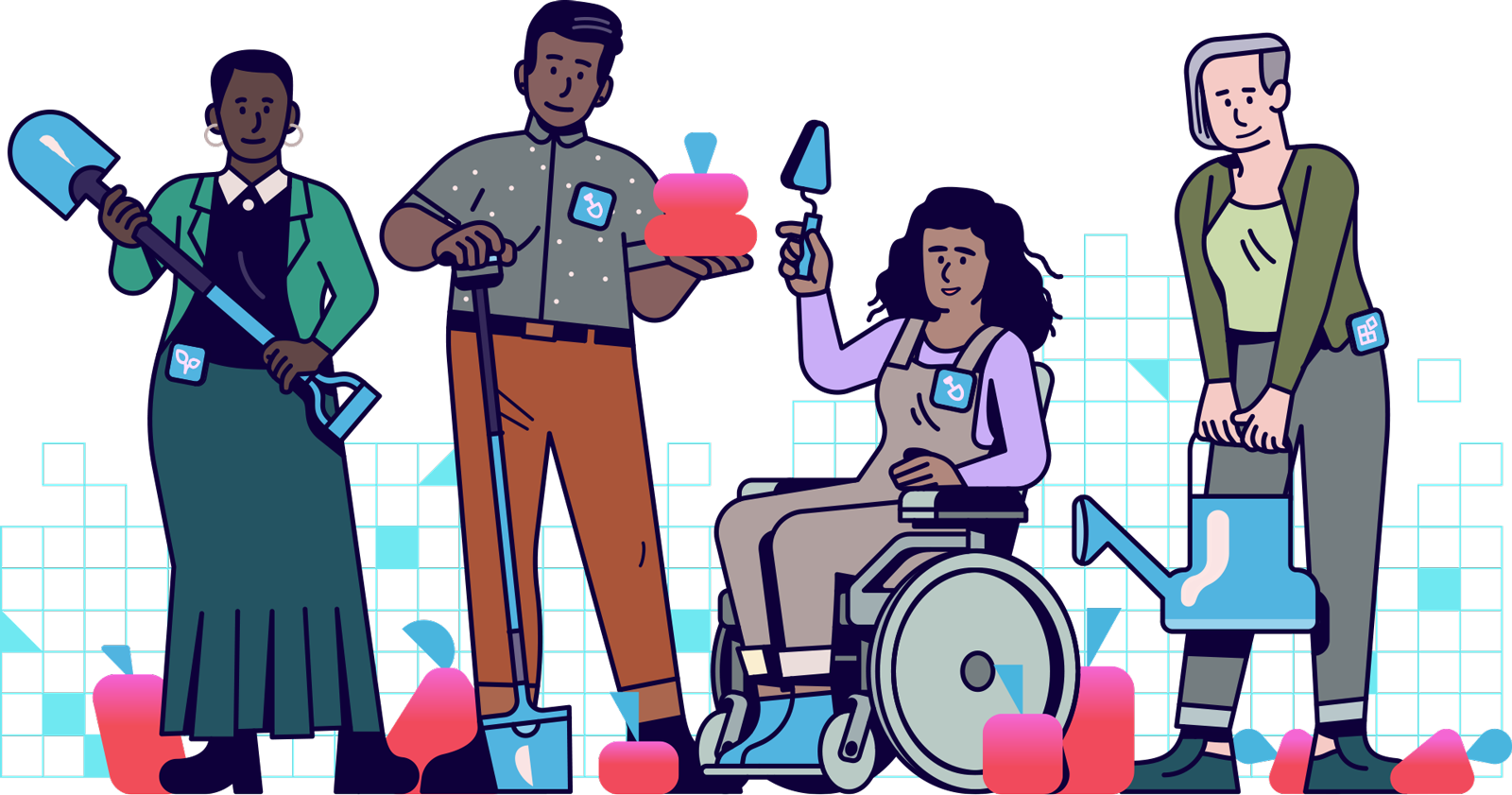
We brought together seven of the partners currently leading Definition cohorts through their digital journeys, to share tips and insights on maximising engagement and value for the charities involved.
As part of the Catalyst and The National Lottery Community Fund COVID-19 Digital Response, 55 organisations are currently working through a Definition programme designed to equip staff with the digital skills, knowledge and confidence needed to identify and implement new digital solutions to existing organisational challenges.
When the programme kicked off in February, successful grantees were grouped into seven cohorts, each led by a digital partner and each working on a specific project area - from strategy and content design, through to elearning, remote communication and community hub management. Since then, cohorts have been working collaboratively to navigate new digital pathways and explore potential solutions.
Throughout, the respective digital partners have provided a combination of one to one support and group sessions to build their cohorts’ digital service design skills. With such a wealth of rich experience in evidence amongst the digital partners, we felt that it would be useful to mirror the collaborative nature of the charities’ experience - and bring together all partners to share any challenges they had experienced, and any insights or tips that may be useful to their counterparts.
We put out an invitation and were fortunate enough to be joined by We Are Open, Outlandish, Reply, Panda, Skills Lab, Erica Neve and Neontribe for a lively discussion, covering three key areas in which partners felt they could use their peers’ expertise. We’ve summarised the tips and advice given below; if you work as a digital, data or design specialist and can add to this list, please do add your comments at the end of the article.
Our thanks go to all the partners for sharing so openly and generously; if you’re currently leading a group of charities on a digital programme, we hope these insights help you.
1. How is peer support working for you in your cohort?
The challenge:
Peer support is really important, as charities’ experiences and stories can help each other as they move along their journey together - but it is very difficult when everyone is physically distanced, and sometimes participants don’t quite have the headspace to be fully involved.
The tips:
- It can take a while for charities to warm up, get to know each other, and feel comfortable jumping in with contributions. A good tip is to run a synchronous, live ‘show and tell’ session: this enables charities to share their journeys in such a way that others are encouraged to join in and contribute their thoughts and tips.
- If you can, design such sessions in order to ensure 100% attendance: if there is a required reporting mechanism for the programme in question (as there is on Definition), align the session to that so that it feels like part of the contractual requirements. This helps everyone to focus on preparing for and participating in the session. Where possible, let people know about the session at the outset, so that it is in their diaries and they can keep it in mind as they go through the programme.
- Structure such sessions tightly, so that there is clear information on the timings with regard to Q&As, and people are aware that they should ask only their most pressing questions. It’s also advisable to have people share useful resources via the chat function; this can then be exported at the end of the call and shared with everyone, so that they have all useful assets and links in one place.
- A common challenge is getting charities to jump in and answer their peers’ questions during sessions - a useful tip is to offer the first answer yourself (as the partner), just to get the ball rolling: this helps encourage others to get involved. If you sense that people are still apprehensive about speaking up, encourage them to add comments into the chat, and then pick these up and elaborate on them - this then often sparks a conversation.
- Create an inclusive culture from the outset, so that everyone feels comfortable speaking up, safe in the knowledge that there are no ‘silly questions’. One cohort on the Definition programme remarked that it would ‘be so nice to all have a coffee together’...and then realised that, in fact, that was exactly what was happening - just in a remote environment! Creating a space where everyone can feel as though they are ‘having a coffee together’ makes the experience feel far more comfortable, supportive and collaborative.
- Don’t worry too much about peer engagement between sessions: this is a ‘nice to have’, but at the moment everyone is so busy that there simply might not be time to engage outside of group sessions. Prioritise discussion within sessions - and set up Slack groups for cohorts if they do want to engage outside of group meetings.
2. How are you handling charities that are struggling to engage?
The challenge:
In any given cohort, there may be charities that struggle to engage: this could be due to a lack of confidence, skills, digital knowledge, time - or a combination of all four. The temptation as an expert in digital is to just ‘do it for them’, because then it will get done (and if they don’t have the headspace to do it themselves, they will be perfectly happy with that) - but this is not ideal: it would be preferable to help participants ‘learn by doing’, so that they develop the ability to take charge of such projects and tasks going forward.
The tips:
- Establish from the very start of the programme that the objective is to upskill rather than to hand-hold, and that this needs to be achieved through participants learning and doing things for themselves, guided and advised (but not spoon-fed) by a digital expert.
- There are essentially two layers in terms of development: one is understanding - and appreciating the importance of - the concepts and processes involved (e.g. user testing), and the other is the more hands-on design and development skills. It is important for participants to be able to fully grasp the core elements of the initial stage, but once it comes to the hands-on - and possibly more technical - tasks, they will naturally need higher levels of practical guidance and support.
- In a situation where someone really doesn’t have the headspace or ability to engage with the learning programme, a ‘teaching through doing’ approach - whereby the digital expert does the majority of the work, but ‘with’ the participant, rather than ‘for’ them - may be the only option, so that they at least leave the programme with a digital product or solution that is fit for purpose. However, in these circumstances, it is probable that they were not the right person to be participating in the programme: if possible, ask for a session with whoever might be taking the lead on digital within the organisation so that you can hand over the resulting solution to them.
- A wider learning that can be embedded into initial programme design and development, is the communications aspect: some Definition participants did not fully understand the nature of the programme, and were expecting to be less hands-on in terms of the digital development work. It is vital that any programmes which will require participants to learn new skills (or upskill themselves in existing areas) must be communicated as such, so that potential applicants understand the level of commitment in terms of personal development, as well as simply time.
- Communicating the nature of the programme effectively also means that charities can ensure the right person is selected to participate: there’s no point assigning someone to the role if they don’t have the requisite level of responsibility and decision making within the organisation to actually carry out the project.
- It’s also important to look at things through the lens of the organisation, not just the individual participant. If, for example, there isn’t a culture of learning within an organisation, they are likely to expect an agency to carry out the work for them. And the size of the organisation makes a difference: larger organisations need significantly more time to roll out programmes and make an impact.
3. How are you balancing the varying needs of eight - or more - charities?
The challenge:
Within cohorts, there is such a wide range not just in terms of levels of digital knowledge, confidence and enthusiasm, but also in terms of what is needed as a result of the programme: people are catering to such varied demographic groups and user needs, that it can be hard to find common ground and make the programme as useful and valuable as possible for all participants.
The tips:
- As well as doing whole-group work, it may be worth sectioning the cohort into sub-groups depending on the commonalities that they share - whether that be in terms of what they are creating, or who they are creating it for. It might not be possible to create these streams at the very start: they may emerge more organically across the initial stages, as it becomes clear who is going to be working on what. But it means that rather than a group of say eight, you can work with three smaller groups on a more personal level.
- If budget permits, you could also consider bringing in outside support in the form of field-specific specialists to run one-off masterclasses and workshops, and / or to offer one-to-one support for sub-groups if appropriate.
- If possible, it is also worth setting up one-to-one calls at the beginning of the programme (and at intervals throughout), connecting with each charity individually.
- A simple tip for optimising engagement and understanding, is to create short videos (e.g. on Loom) after each session, summarising the discussions. This type of video doesn’t need to be polished or technical: it can just be a verbal summary of the key points. These can then be shared across whichever platforms you are using for the cohort (e.g. Notion / Slack / other). This can help people who might have struggled to keep the thread within the sessions review and understand the topic at hand.
- Along similar lines, it’s advisable to use a platform (such as Notion) on which all programme materials, event dates and other information can be stored for easy search and access. This means that participants can go back and access information from the group calls if they struggled to keep pace during the session.
- If you are running additional workshops alongside the one-to-one support and group calls, it’s worth having a weekly’ stand-up’ that explains what the workshop will cover so that people can elect whether to join in person or whether to catch up via any materials produced after the event.
The Definition programme is due to wrap up at the end of this month, so look out for a blog outlining some of the charities’ key learnings in a few weeks’ time!

Support & services
Our free services help you make the right decisions and find the right support to make digital happen.
Learn what other non-profits are doing
39+ organisations share 50+ Guides to how they use digital tools to run their services. Visit Shared Digital Guides.



